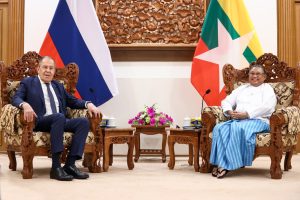Myanmar’s military junta signed deals on wind energy projects and direct flights during meetings with Russian officials last week, marking the latest sign of convergence between the two pariah states. According to a report in The Irrawaddy, the agreements were signed during the International Economic Forum in St. Petersburg, sometimes referred to as the “Russian Davos,” last week.
The publication reported that Thaung Han, the junta’s minister of electric power, met with Alexey Likhachev, the director general of Russia’s state-owned nuclear firm Rosatom, to discuss possible power projects. He then signed a memorandum of understanding on June 15 with Rosatom subsidiary NovaWind, and agreements with two Russian companies about conducting feasibility studies into the creation of two wind power projects in Mandalay and Magway regions.
Kan Zaw, the junta’s investment and foreign economic relations minister, told forum attendees that Myanmar Airways International will establish a symbolic direct air link to Russia beginning next month, with direct flights from Yangon and Mandalay to Moscow and Novosibirsk. He also said the Ministry of Hotels and Tourism will introduce a goodwill scheme with Russia in a bid to revive the country’s moribund tourism sector, including visa exemptions for Russian nationals.
The nature of the agreements is in many ways less important than how they reflect the steady strategic convergence between the two nations, at a time when both are under growing international pressure.
While relations have been on the up for years – for instance, Myanmar purchased an estimated $1.5 billion in military hardware from Russia from 1999 to 2018, accounting for 39 percent of its total arms imports – the Myanmar military’s coup in February 2021 and the Russian invasion of Ukraine a year later have seen the two nations huddle together to fend off challenges from the West.
Russia has supported the military’s attempts to crush through force of arms the resistance to its rule and offered it crucial international support, including further supplies of arms. Since the coup, junta chief Senior Gen. Min Aung Hlaing has made three visits to Russia, and his junta has purchased further Russian-made military equipment, including jet fighters and helicopters. The two countries have also signed an agreement for Rosatom, Russia’s state-run nuclear corporation, to set up a technology center in Yangon, with an eye to the eventual construction of a small-scale nuclear reactor.
In exchange, Naypyidaw has joined the clutch of despotic regimes that have publicly supported Moscow’s position on the war in Ukraine, while Min Aung Hlaing has spouted oleaginous praise about Russia’s President Vladimir Putin.
Given the lifeline that Russia has offered to Min Aung Hlaing’s junta, its influence has been the subject of repeated denunciations by the opposition National Unity Government (NUG) and its various allies. In a statement on June 10, the National Unity Consultative Council, which includes representatives of the NUG, said that Russia’s support was “prolonging the sufferings of the people of Myanmar.”
“The diplomatic and military support provided by Russia is the basis for the terrorist Min Aung Hlaing group to totally disregard the agreements developed within the ASEAN, and also creates difficulties for other nations to work on solving Myanmar’s political issues,” it added.

































